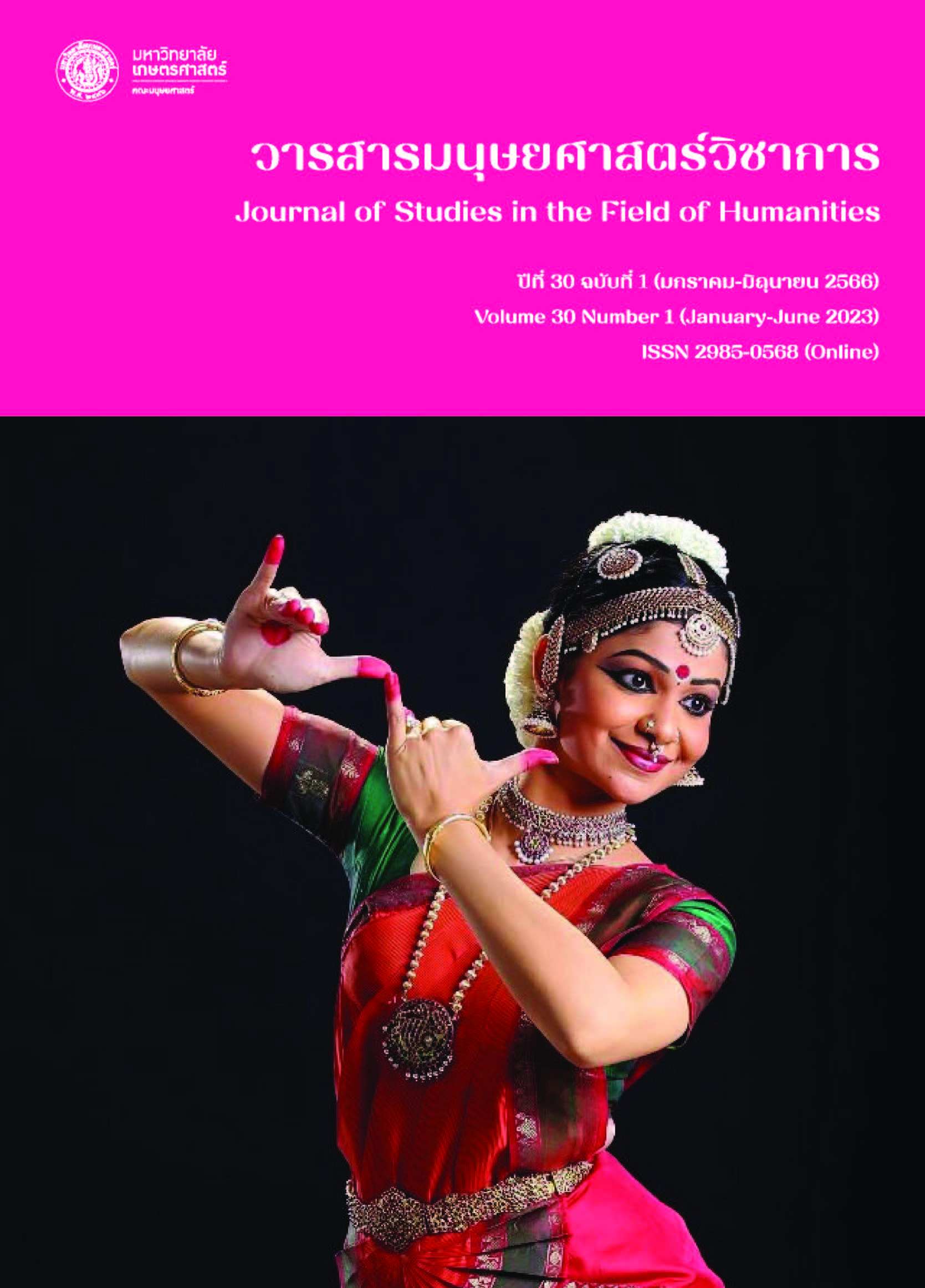From “Author-Scriptor” to “Author-Constructor”: The Authorial Theory of the 1960s and a Repercussion in Contemporary Literature
Main Article Content
Abstract
Studies on authorial theory and authorship have proliferated during the past two decades. The majority of academic works on the topic have made reference to the authorial theory of the 1960s, which was the time when progressive ideas and methods of literary analysis and criticism revealed notable influences from structuralism, poststructuralism, psychoanalytic theory, and Marxism. The authorial theory that appeared in the writings of three influential theorists in the 1960s was the first object of interest of this research paper's analysis and discussion. The concepts that will be examined include the death of the Author-God and the author-scriptor in Roland Barthes' "The Death of the Author" (1968) and “From Work to Text” (1971), the author as producer in Pierre Macherey's A Theory of Literary Production (1968), and the author-function and discursive practice in “What Is an Author?” (1969) by Michel Foucault. The second objective of this research article is to critically respond to the authorial theory of the 1960s through a study of a contemporary literary text, The Loss Library and Other Unfinished Stories by Ivan Vladislavić. This analytical and critical study will focus on the concept of the author as architect/constructor, the paratextual practice, and the ontology of literary texts.
Article Details

This work is licensed under a Creative Commons Attribution-NonCommercial-NoDerivatives 4.0 International License.
References
บาร์ตส์, โรล็องด์. (2547). มรณกรรมของผู้แต่ง (ธีรา สุขสวัสดิ์, ผู้แปล). ใน รื่นฤทัย สัจจพันธุ์ (บ.ก.), พลังการวิจารณ์: วรรณศิลป์ (น. 699-709) กรุงเทพฯ: ประพันธ์สาส์น.
พจนานุกรมศัพท์วรรณกรรม ฉบับราชบัณฑิตยสภา. (2561). กรุงเทพฯ: สำนักงานราชบัณฑิตยสภา.
สุรเดช โชติอุดมพันธ์. (2559). ทฤษฎีวรรณคดีตะวันตกในคริสต์ศตวรรษที่ 20. กรุงเทพฯ: จุฬาลงกรณ์มหาวิทยาลัย.
Barthes, R. (1977). The death of the author. In Image-music-text (S. Heath, Trans.) (pp. 142-148). New York: Fontana.
Barthes, R. (1979). From work to text. In J. V. Harari (Ed.), Textual strategies: perspectives in post-structuralist criticism (pp. 73-81). Ithaca: Cornell University Press.
Benjamin, W. (1999). The Arcades project. Boston: Harvard University Press.
Benjamin, W. (2003). The origin of German Tragic drama (J. Osborne, Trans.). London: Verso.
Bennett, A., & Royle, N. (2016). An introduction to literature, criticism and theory. New York: Routledge.
Burke, S. (1995). Authorship: From Plato to the postmodern. Edinburgh: Edinburgh University Press.
Burke, S. (2022). The death and return of the author. Edinburgh: Edinburgh University Press.
Caughie, J. (2013). Theories of authorship. New York: Routledge.
Derrida, J. (2001). Structure, sign, and play in the discourse of the Human Science. In Writing and difference (pp. 351-370). London: Routledge.
Eagleton, T. (1975). Pierre Macherey and the theory of literary production. Minnesota Review, 5(1), 134-144.
Ferreira-Meyers, K. (2013). Second “nature” and autofictional strategies in Ivan Vladislavić’s Portrait with Keys: Joburg and What-What. EAU Heritage Journal Social Science and Humanities, 3(1), 39-50.
Foucault, M. (2000). What Is an author?. In P. Rabinow (Ed.), The essential works of Michel Foucault, 1954-1984. Vol. 2, aesthetics (pp. 205-222). London: Penguin.
Gaylard, G. (2023). At home with Ivan Vladislavić: An African flaneur greens the postcolonial city. New York: Taylor & Francis.
Genette, G. (1997a). Palimpsests: Literature in the second degree. Lincoln: University of Nebraska Press.
Genette, G. (1997b). Paratexts: Thresholds of interpretation. Cambridge: Cambridge University Press.
Goldblatt, D., & Vladislavić, I. (2010). TJ| Double Negative. Italy: Contrasto.
Graham, J. (2016). At home in Johannesburg?: Rethinking cosmopolitanism through TJ/Double Negative, the Joint Project between David Goldblatt and Ivan Vladislavić. Ariel: A Review of International English Literature, 47(1), 193-222.
Kebłowska-Ławniczak, E. (2020). The Loss Library and Other Unfinished Stories: Towards a collection of creative paratextual writing or literature in potentia. English Studies in Africa, 63(2), 48-64.
Lang, M. (2022). Conceptions of literary authorship in modern literary theories: History, issues, approaches. Frontiers of Narrative Studies, 8(1), 78-100.
Law-Viljoen, B. (2011). Interview with David Goldblatt and Ivan Vladislavić. In G. Gaylard (Ed.), Marginal spaces: Reading Ivan Vladislavic (pp. 340-357). Johannesburg: Wits University Press.
Macherey, P. (2015). A theory of literary production. Oxon: Routledge.
Miller, A. (2006). Inside the toolbox: Andie Miller in conversation with Ivan Vladislavić: interview. Scrutiny2, 11(2), 117-124.
Owens, W. R. (2010). Glossary. In D. da Sousa Correa & W. R. Owens (Eds.), The handbook to literary Research (pp. 207-223). Oxford: Routledge.
Roald Dahl: Why are they rewriting Roald Dahl?. (2023). Retrieved February 21, 2023, from https://www.bbc.co.uk/newsround/64715287.
Shafi, S., & Knight, L. (2023). Roald Dahl publisher announces unaltered 16-book classics collection. Retrieved February 24, 2023, from https://www.theguardian.com/books/ 2023/feb/24/roald-dahl-publisher-announces-unaltered-16-book-classics-collection.
Smith, Z. (2009). Changing my mind: Occasional essays. London: Penguin UK.
Smith-Laing, T. (2018). An analysis of Michel Foucault's What is an Author?. London: Macat.
Stopford, J. (1990). The death of the author (as producer). Philosophy & Rhetoric, 23(3), 184-191.
Stougaard-Nielsen, J. (2019). The author in literary theory and theories of literature. In I. Berensmeyer, G. Buelens & M. Demoor (Eds.), The Cambridge handbook of literary authorship (pp. 270-287). Cambridge: Cambridge University Press.
Syed, A. (2023). Why rewrites to Roald Dahl’s books are stirring controversy. Retrieved February 24, 2023, from https://time.com/6256980/roald-dahl-censorship-debate/.
Thomasson, A. L. (2015). The ontology of literary works. In J. Gibson & N. Carroll (Eds.), Routledge companion to philosophy of literature (pp. 349-358). London: Routledge.
Vladislavić, I. (2009). Portrait with keys: the city of Johannesburg unlocked. New York: WW Norton & Company.
Vladislavić, I. (2012). The Loss Library and Other Unfinished Stories. London: Seagull Books.
Wimsatt, W. K., & Beardsley, M. C. (1946). The intentional fallacy. The Sewanee Review, 54(3), 468-488.
Young, E. (2001). ‘Or is it just the angle?’ rivalling realist representation in Ivan Vladislavić’s Propaganda by Monuments and Other Stories. The English Academy Review, 18(1), 38-45.


